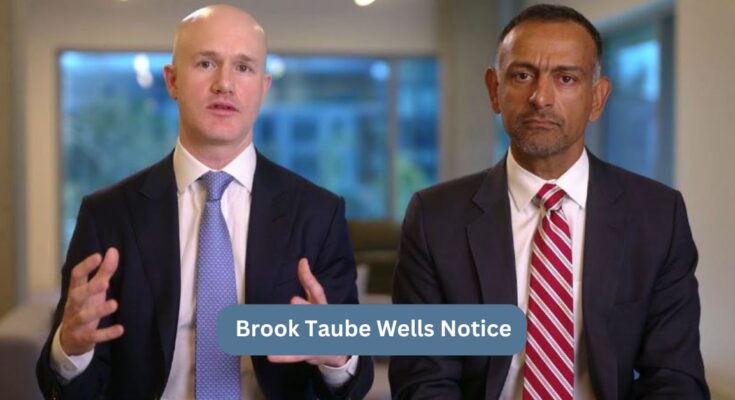Table of Contents
Have you ever heard of a Wells Notice and wondered what it means for your financial future? If you’re not familiar with this term, don’t worry—you’re not alone.
This blog post will delve into the world of Wells Notices, specifically focusing on Brook Taube Wells Notices.
So grab a cup of coffee and get ready to unravel the mystery behind these important documents that could significantly impact your investments.
What is a rook Taube Wells Notice?
A Wells Notice is a formal notification sent by the Securities and Exchange Commission (SEC) to inform individuals or entities that it intends to bring an enforcement action against them. It serves as a warning that the SEC has conducted an investigation and believes there may have been violations of securities laws.
The notice outlines the allegations and allows recipients to respond before any formal charges are filed.
Receiving a Wells Notice can be a stressful experience, as it signals potential legal trouble ahead. Recipients must take this notification seriously and seek appropriate legal counsel to navigate the complex process effectively.
Understanding the implications of a Wells Notice is essential in protecting your interests and financial well-being.
How Does a Brook Taube Wells Notice Work?
Have you ever wondered how a Brook Taube Wells Notice works? Let’s delve into the process. When the Securities and Exchange Commission (SEC) suspects potential securities laws violations, they may issue a Wells Notice to notify individuals or entities of their intent to recommend enforcement actions.
Receiving a Wells Notice can be daunting, as it signifies that the SEC has concluded its investigation and is considering taking legal action. However, it provides recipients with an opportunity to respond before any formal charges are filed, allowing them to present their arguments and evidence in defense.
After receiving a Wells Notice, individuals can submit a “Wells submission,” which outlines their perspective on why enforcement action should not be taken against them. The SEC will then review this submission before making a final decision on whether or not to proceed with charges.
Understanding how a Brook Taube Wells Notice operates can help individuals navigate this challenging situation effectively and seek appropriate legal counsel for guidance.
The Role of the Securities and Exchange Commission (SEC)
The Securities and Exchange Commission (SEC) regulates the securities industry vitally. It enforces federal securities laws, protects investors, and maintains fair and efficient markets. The SEC also oversees financial disclosures to ensure transparency and prevent fraud within the market.
Additionally, the SEC investigates potential violations of securities laws through enforcement actions. The SEC aims to maintain trust in the financial system by holding individuals and entities accountable for misconduct and promote integrity and confidence in capital markets through regulatory oversight.
The SEC’s mission is to protect investors while facilitating capital formation. Its work impacts various stakeholders in the financial industry by promoting compliance with regulations that safeguard market participants from unfair practices.
How a Wells Notice is Triggered
When understanding how a Wells Notice is triggered, it’s crucial to grasp the process.
The trigger typically occurs after the Securities and Exchange Commission (SEC) completes an investigation into potential securities law violations. During this investigation, if the SEC staff believes there may have been misconduct, they will draft a Wells Notice.
The Wells Notice warns individuals or entities about possible enforcement action by the SEC. It outlines the allegations and allows recipients to respond before any formal charges are filed.
Receiving a Wells Notice can be alarming as it indicates that regulatory scrutiny is imminent. The notice puts recipients on notice that they need to defend themselves against potential accusations of wrongdoing.
Understanding how a Wells Notice is triggered illuminates the seriousness of the situation and emphasizes the importance of seeking legal counsel promptly.
What to Do if You Receive a Wells Notice
Receiving a Wells Notice from the SEC can be daunting, but remaining calm and composed is crucial. Carefully review the notice and understand the allegations against you. Seek legal representation immediately to ensure your rights are protected throughout the process.
Gather all relevant documents and information related to the investigation. Cooperate with your legal counsel in crafting a detailed response addressing each point raised in the Wells Notice. Responding within the specified timeframe while maintaining transparency and honesty is essential.
Engage with your attorney to strategize how best to present your case before the SEC. Prepare for potential outcomes of settlement negotiations or litigation proceedings by proactively building a solid defense.
Remember that receiving a Wells Notice does not automatically mean guilt – it is merely an opportunity to effectively address concerns raised by regulatory authorities. Stay focused, stay informed, and trust in your legal team to guide you through this challenging process.
The Importance of Legal Representation
Navigating a Wells Notice from the Securities and Exchange Commission (SEC) can be daunting. Legal representation during this process is crucial in protecting your rights and interests. A skilled attorney specializing in securities law can provide invaluable guidance on responding effectively to the Wells Notice.
Legal experts can help you understand the allegations against you, assess the potential risks, and strategize the best course of action. They have experience dealing with regulatory agencies like the SEC and can ensure that your responses are thorough, accurate, and compliant with all legal requirements.
Furthermore, having legal counsel by your side demonstrates to regulators that you are taking their inquiry seriously and are committed to cooperation. This proactive approach may lead to a more favorable outcome in resolving any issues identified by the SEC.
Entrusting your case to knowledgeable attorneys in complex matters like a Wells Notice gives you peace of mind, knowing that professionals are advocating for your best interests every step of the way.
Case Studies of Past Wells Notices and Outcomes
Let’s delve into some real-life examples of how Wells Notices have impacted individuals and companies in the past. One case involved a prominent investment firm accused of insider trading, resulting in hefty fines and reputational damage.
In another instance, a high-profile executive received a Wells Notice for allegedly misleading investors about company performance. This led to an extended legal battle and, ultimately, resignation from their position.
A pharmaceutical company faced scrutiny for potential accounting irregularities following the issue of a Wells Notice. The aftermath included financial penalties and ongoing monitoring by regulatory authorities.
These cases highlight the severe consequences of receiving a Wells Notice. It underscores the importance of taking swift and strategic action with legal counsel to navigate such challenging situations effectively.
Conclusion
Receiving a Wells Notice can be a daunting experience, but it’s essential to handle it with care and precision.
The implications on your financial future can be significant, making it crucial to seek legal representation immediately. Understanding the process, responding appropriately, and cooperating with the SEC are all vital steps in navigating this challenging situation.
By being proactive and strategic in your approach, you can work towards achieving the best possible outcome for yourself and safeguarding your financial interests in the long run.
Remember, facing a Wells Notice may be stressful, but with proper guidance and support, you can effectively navigate this regulatory hurdle and protect your financial future.
Good luck, game changer!
Explore our additional articles for more insights and enjoy!










